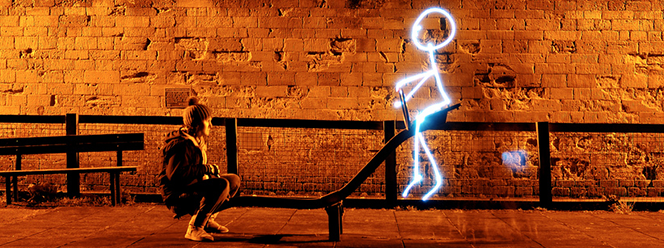
by Tara Joyce | Jun 15, 2016 | Cultural Creativity

We learn to articulate our personal power by saying no.
Feeling my desire to be agreeable, and my fear of rejection, I say no anyway. I learn to be more me.
There is wonder in the myriad of consequences created by responding negatively to requests. There is magic in how life moves forward, without interruption. “No” proves to be less important than we think it is.
Our agreeableness is not that valuable. Assertive and at ease, when I can say no with freedom, I can say yes with utmost certainty, sincerity, and enthusiasm. This is the space I desire to be.
Yes almost always has a cost. I can feel good paying it when I know my reasons are rooted in what I value and appreciate. I can no longer be agreeable for agreeable’s sake. The price is one I’m no longer willing to pay.
photo credit: Martin Howard

by Tara Joyce | Jun 10, 2016 | Cultural Creativity, Personal Branding

It’s an endless quest to be good enough in another person’s eyes. Not facing our own thoughts and feelings, we measure our self using the eyes of another. Unable to acknowledge it’s really our own perception of self that we use as the measure—not theirs.
It takes practice to feel good and whole as we are. Sometimes, rather than doing this, we buy clothes and things, chase and stockpile money, and do what we can to be “better” than others. In comparison, we find our worth.
Rather than question and/or remove ourselves from the mindsets and situations that exert and encourage this dance of superiority/inferiority, we can find ourselves feeding into it and trying to puff ourselves up in order to match it—and even beat it. In our armour of clothes, hair, beautiful things, and pomp we are elevated and protected.
A culture of buying into the need to feel superior (and invariably, inferior) to others. A collective experience encouraging us and teaching us all to feel so very insecure.
Repeatedly pushed and pulled to feel inferior and superior, internally and externally, this wild see-saw of emotion is crazy-making. In our totality, we are no better nor worse, yet we each have qualities that make us “better” than another. It’s focusing on these qualities that gets us caught on the see-saw. Feeling superior ultimately leads to feeling inferior. And vice versa. The pendulum keeps swinging, the see-saw rises and falls.
How do we know what is impressive to another? Thinking what impresses us is what impresses everyone leaves us in fantasy, believing everyone is like us. And they are not. Acknowledging our fantastical expectations, we are pulled by them less by them—and we’re less likely to push them on others, keeping ourselves on the see-saw.
We are neither as perfect nor as terrible as we imagine ourselves (and others) to be. Accepting this frees us from the push and pull to be “the best.” Equanimity actively dissolve the illusion surrounding us.
For our own happiness, we need to own the places where we compete and compare, where we feel inferior and superior to others. It’s so very okay that we ride the see-saw. It’s so very okay we measure our self against others. Owning this, we make the see-saw an easier ride for all of us. Now, the pendulum has less space to swing, and the ride becomes less wild. For the moment, in our truth, we are each good enough.
photo credit: Mike Leary

by Tara Joyce | Jun 1, 2016 | My Journey | What's On My Mind

So good at the act that you forget what’s true.
So good at pretending that the unreal becomes real.
What you feel is under your control.
You can simply act it away.
A mask of neutrality.
Leads you to believe you might actually feel it.
You can ignore your feelings.
You can act forever.
Yet at some point, the inevitable curtain comes down, and the performance ends.
You are left with you; and the feelings you’re pretending aren’t there.
If only for a moment.
The act is over.
What then?
Who are you when your truth has space to be?
The question, terrifying.
Its answer even more so.
It lies in love and the shape of it.
What does your love and care look like when there is no performance to mask it?
photo credit: Ania

by Tara Joyce | May 19, 2016 | Self/Business Growth

Emotional littering is when I attempt to alleviate my own overwhelming emotions by disposing of them elsewhere, when I inherently know they’re mine to be responsible to.
In those moments, I don’t want to own what I’m feeling and how I’m reacting to it. Instead, I’m trying to drop my responsibility into another’s backyard. To put it on them.
I’m not making space for my stuff, and I’m attempting to alleviate this by leaving it for someone else to take care of. I’m pretending to not be attached to what I’m feeling.
I am emotionally littering. And in doing so—in not being responsible to how I feel—I’m giving away my power to feel differently. What a waste.
photo credit: Steven Pisano

by Tara Joyce | May 13, 2016 | Innerpreneurship, Self/Business Growth

A plant needs space, and a seed, as its container to grow. The seed is a boundary from which the plant grows, as is the space that it takes root and grows in.
To ensure our plants—the ones we choose to nurture and grow—have the space they need to grow free from invasive intruders, we weed our landscape.
Our relationships are no different. They are a landscape that needs our attention.
Weeding is necessary, as is protecting our space from the things we do not need, nor want, within it.
Defining our boundaries in this way is not as a fear-based act of protection, but rather a necessary and abundance-ensuring act that supports the growth of what we care about nurturing.
Everything living needs boundaries to build strong foundations from. What grows from us is no different.
Our boundaries nurture what we care to come to fruition.
photo credit: Enid Martindale










